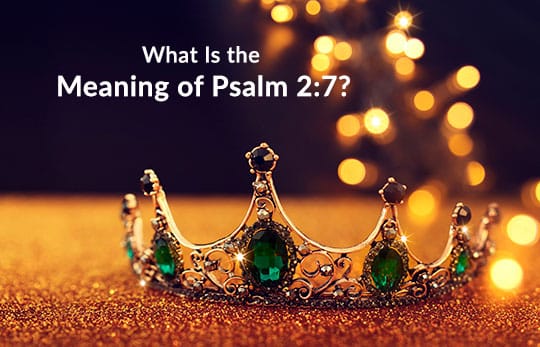Bible Question:
What is the meaning of Psalm 2:7? What does "My Son" mean?
Bible Answer:
What is the meaning of Psalm 2:7? This verse reveals the identity of Jesus Christ. It is a very important prophecy about Jesus Christ and the Messiah. Let us discover the meaning of “My Son.”

What Is the Meaning of Psalm 2:7?
Psalm 2:7 is a prophecy that refers to Jesus Christ as “My Son.” In order to understand the meaning of “My Son,” we must consider Psalm 2:6-8. Here is the passage,
“But as for Me, I have installed My King Upon Zion, My holy mountain.”
“I will surely tell of the decree of the LORD: He said to Me, ‘You are My Son, Today I have begotten You.
Ask of Me, and I will surely give the nations as Your inheritance, And the very ends of the earth as Your possession.'” Psalm 2:6-8 (NASB)
At first the Father says that He has installed “My King” upon Zion, My holy mountain.” Zion refers to Jerusalem which sat on a mountain called Zion. Then in verses 7-8, Christ says the Father had decreed, “You are My Son, Today I have begotten You.” Verse 8 continues the quote of Christ about the Father’s statement to Him. This helps us understand that the decree in verse 7 refers to God the Father installing His king upon Zion. Verse 8 reveals the Father planned to have Christ rule over all the nations of the world. The world would be Christ’s possession.
What Is the Meaning of My Son?
Therefore, “My Son,” in verse 7, refers to a Father-Son relationship that reflected the promise made to King David in 2 Samuel 7:13-16, which is called the Davidic Covenant. In the covenant, God the Father promised King David that his throne would be established forever. Thus the decree of the Father in verse Psalm 2:7 fulfills the promise of the Davidic Covenant. The covenant will be fulfilled with an eternal Son, a descendant of David, on the throne. The Messiah, Jesus Christ is that Son. Thus He is called “My Son” and the “Son of God.”
In the New Testament, “My Son” is quoted and used in relation to Jesus Christ’s childhood (Matthew 2:15), His resurrection (Acts 13:32-33; Romans 1:3-4), His eternal exalted Sonship (Hebrews 1:5), and finally His superiority as high priest (Hebrews 5:5). Thus, the “My Son” refers to the eternal and divine Son, who will rule as the Messiah. He is the eternal, priestly, divine king who will rule the nations.
Thus, “I have begotten you” does not refer to Christ being born, but to the declaration of Christ as the Son in order to fulfill the Davidic Covenant. Another reason begotten cannot refer to Christ being born or created is that “My Son” is the eternal and divine God (Hebrews 1:5). It is clear from Acts 13:33 that begotten is applied to the resurrection.
Conclusion:
Psalm 2:7 quotes the Son of God, who tells us what God the Father spoke to Him. The Father said, “You are My Son, Today I have begotten You.” When the Father said that, He decreed that Christ is the eternal, priestly, divine king who will rule the nations as the Messiah. That is, the Messiah would be God Almighty Himself. Notice Micah 5:2 says,
But as for you, Bethlehem Ephrathah,
Too little to be among the clans of Judah,
From you One will go forth for Me to be ruler in Israel.
His goings forth are from long ago,
From the days of eternity.”
Micah 5:2 (NASB)
Here we are told the Messiah would be born in Bethlehem. He would be from “long ago” or antiquity. He would be “from days of eternity.” No man could be eternal, only God. Since we are told the Messiah will be born in Bethlehem, that reveals Jesus Christ is the Messiah, and our God. He is the “My Son” as prophesied in Psalm 2:7. Let us know our knees in worship to our God.
Suggested Links:
Son of God — What does Son of God mean relative to Christ?What does Son of Man and Son of God mean?
What is the meaning that Jesus is the Son of God?